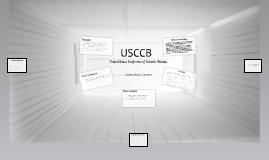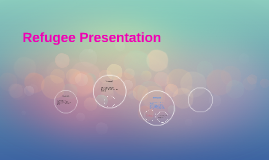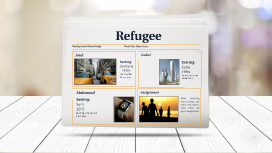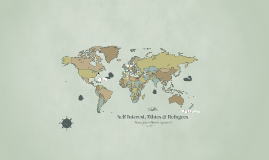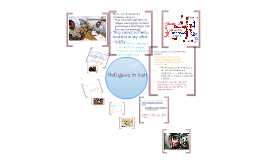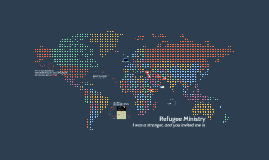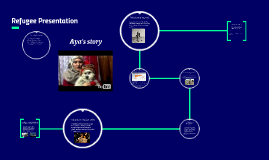Refugee Presentation
Transcript: How do people apply to gain entry as refugees? Who is considered a refugee? The Moral Angle: Humanity, Dignity and Democracy The Pragmatic Angle: Global Self-Interest Carens on Mixed Migrant Flows Carens proposes two ways to solve the non-refoulment problems. Resettlement as a Strict Duty: Carens argues that resettlement should be seen as a strict duty rather than a generous gift and that states should take in refugees based on their immigration history, capacity, population density and economic level. Carens argues the biggest barrier to such a system is not our disagreements over what is fair, but our reluctance to do what is morally required of us. Breaking the Link Between Claim and Place: Carens argues that separating where a refugee finds initial asylum and where they ultimately find a permanent home would mitigate targeted asylum claims. Carens also argues that, while appealing, such a system has the flaw of making it difficult to ensure the rights of those sent to other states and would be politically unpopular due to the requirement for democratic states to pay for these programs. Failing States & the State System: States have a vested interest in maintaining the state system. Failing or unstable states proliferate and threaten the state system. The refugee crisis currently threatens the stability of Turkey, Jordan, Lebanon, Greece, Italy and Bulgaria and also exacerbates problems present in Iraq, Libya and elsewhere. Instability in the region will not resolve itself and due to the volatile political climate, both great power and regional, in the Middle East there is much risk in allowing the situation to deteriorate further. Unmixed Migration: Instituting such a framework successfully would eliminate refugees from the mixed migration flows and help draw a clearer distinction between refugees and economic migrants; legitimizing efforts to keep migrants out. As such it is in the interest of states with an interest in the EU's stability to enact such a system. Direct Impact: Such a system could be enacted to direct effect, housing well funded refugee centers in Turkey for legitimate, guaranteed refugee processing would draw refugees away from the EU and help differentiate between migrants and refugees in the short term. Due to the scale of the conflict and the actors involved; there is no end in sight. Heavy damage to thousands of structures; including hospitals, schools and workplaces. Syria is now a dangerous, inhospitable environment for Syrian civilians. 250,000 - 400,000 Syrians are killed. 1.5 million Syrians wounded. 13.5 million Syrians in need of aid. 7.6 million Syrians internally displaced. 6 million Syrians made refugees. Why Should Democratic states take in Refugees? Time for a Better System? To claim that EU states do not have legitimate security concerns from incoming migration is deeply flawed; as the severe impact migration has had on Italy, Greece and Bulgaria shows. While in general terrorist threats tend to emanate from within states, there have been multiple reports of foiled attempts of attacks within Germany and an inability to screen migrants properly due to volume is a serious concern. Long term security concerns, such as those posed by second generation muslims, could be considered significant as well and are not considered. Migration inspired populism could also be considered a drastic threat to the region; with semi fascist groups having a resurgence in the wake of fear over migration. The Result: Humanitarian Crisis Neighboring States: Turkey, Lebanon & Jordan A policy of exclusion in favor of domestic stability. Orban seeks to increase border controls, combat trafficking and smuggling operations and accept normal immigration flows. He seeks to stem the tide of migration through the creation of tougher border controls within Europe; much like those seen in Greece and Italy. These controls should in theory deter migration, slow down the flow of migrants into the EU. and allow the EU to properly protect itself against foreign fighters and potential terrorists. This take is against the grain among EU states, but is supported by many eastern EU states. Orban's policy is representative of a strong vein of anti-immigration sentiment present and growing amongst almost all EU states; making the maintenance of ambitious humanitarian policies politically difficult. Systems of Admission Open Borders: Merkel & Germany The Current Response: "Fortress Europe" Hundreds of millions of euros sent in aid to Greece, Spain and Bulgaria. Hundreds of miles of razor wire fences are built to deter and control migrants. Large camps are set up (especially in Bulgaria) to house and process refugees. Due to the Dublin Law, processed refugees often cannot move further into Europe. The net effect is Bulgaria, Greece, Italy and Spain act as barriers to central Europe; creating a "fortress" to stem the flow of refugees and migrants. Mistreatment of migrants: Removing the flow of refugees from mix






